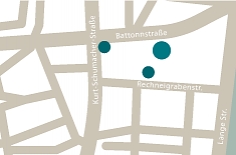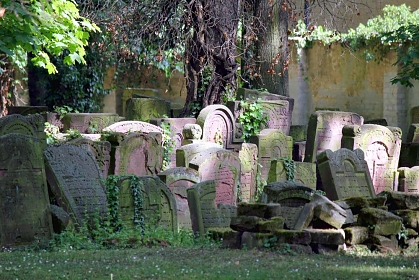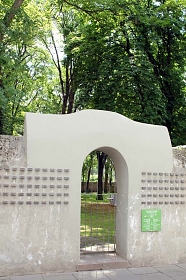The first interments in the Jewish Cemetery on Battonnstrasse can be dated back to the year 1272, as evidenced by the few remaining gravestones. It is among the oldest of its kind in Europe.1 Because Judaism regards the cemetery as an eternal place of rest, graves may not be dismantled nor may stones be removed. If there is no more land available for new interments, earth is piled on top of an existing grave in order to make a new grave. The dead are thus buried on top of one another. These interment rules have given rise to the typical scene of gravestones crowded together in a row, as they are in the small section of original gravestones on Battonnstrasse. By 1828, space had been exhausted and the cemetery, containing nearly 7000 graves, had to be closed.2
In 1942 the National Socialists demolished approximately 4666 gravestones and piled up the rubble for removal. Some of these stone heaps can still be seen today. 175 gravestones were removed, but not crushed. Among them is the gravestone of Mayer Amschel Rothschild, founder of the banking dynasty. In the 1950s the gravestones were returned to the cemetery, but because there was no information on their original location they could only be placed along the cemetery wall. However, gravestones of important religious and secular personalities were grouped together in a place of honor.
Of interest are the motifs on many of the gravestones, which are family coats of arms. The images portray the names of the families that were derived from animals, mythical creatures and objects. This is a peculiarity of the Frankfurt cemetery. The small stones on the gravestones as signs of remembrance and the tiny pieces of paper containing supplications that were placed in the cracks of gravestones of particularly venerated rabbis, typify Jewish graves. Among these is the gravestone of Talmud scholar Pinchas haLevi Horowitz, who was a rabbi in Frankfurt from 1772 until his death in 1805.
Entrance to the cemetery is via a gate on Battonnstrasse. The key may be obtained at the Museum Judengasse (except on Jewish holidays). Please bring a valid ID to deposit as security. Men are requested to wear a head covering (Kippa, for example).


